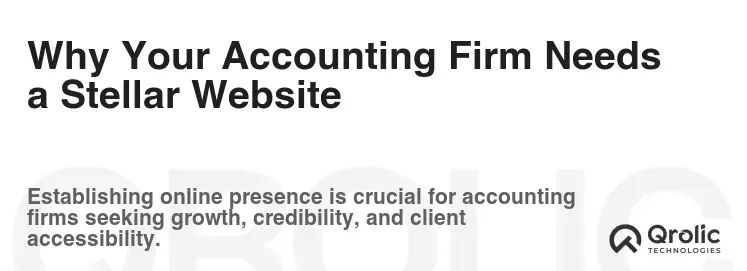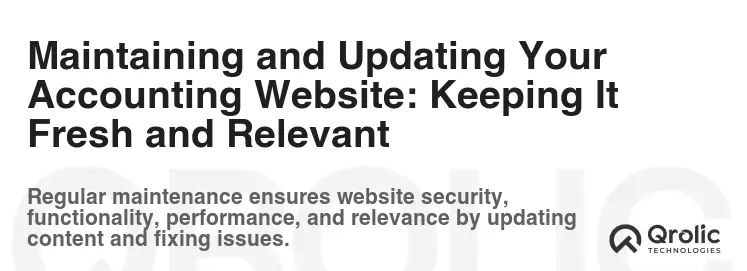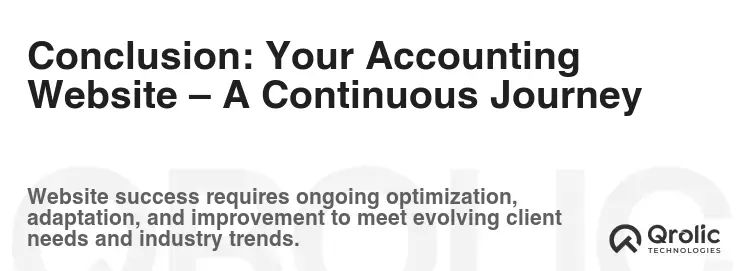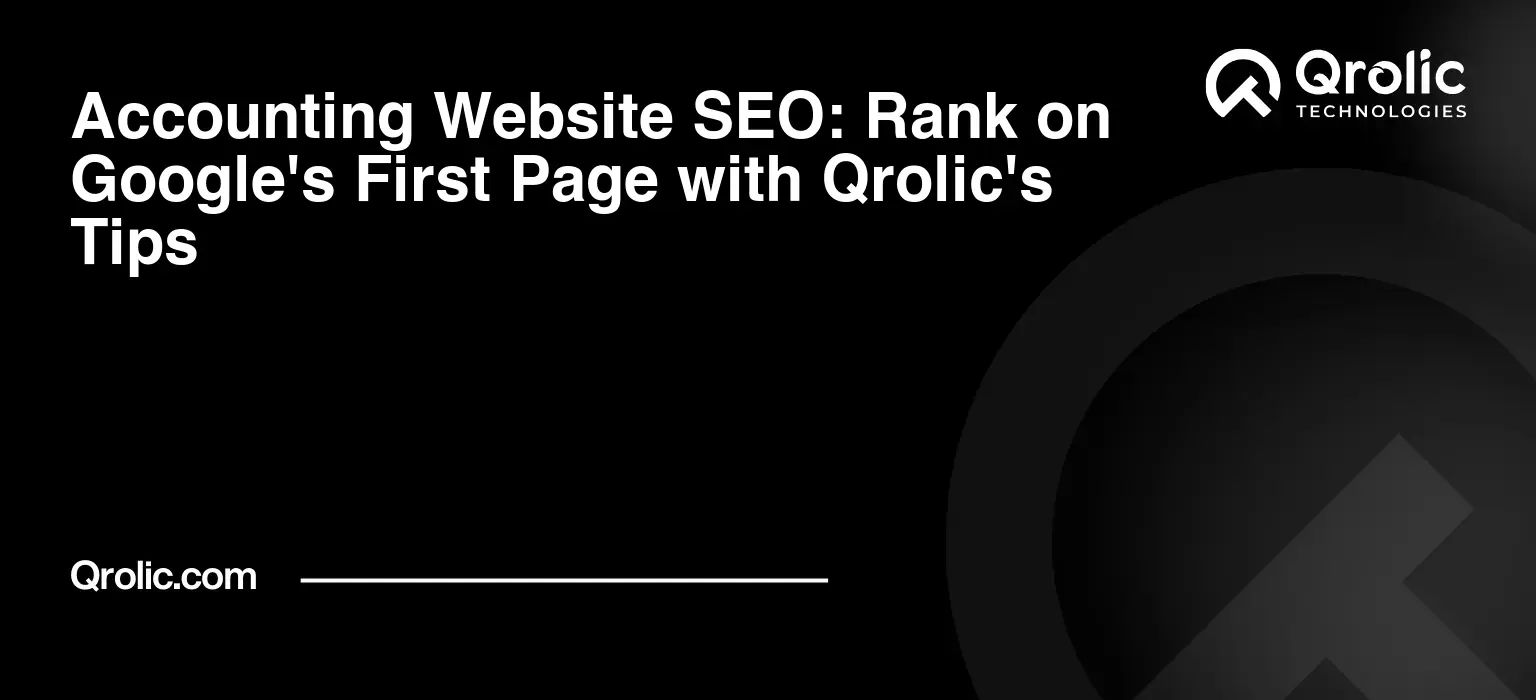Quick Summary:
- Plan thoroughly: define audience, goals, and content.
- Choose platform wisely; design professional and mobile-friendly.
- Write quality content and optimize for search engines (SEO).
- Promote, maintain, and regularly update your accounting site.
Table of Contents
- Why Your Accounting Firm Needs a Stellar Website
- Planning Your Accounting Website: Laying a Solid Foundation
- 1. Define Your Target Audience
- 2. Establish Your Website Goals
- 3. Conduct Keyword Research for SEO
- 4. Develop a Site Map and Navigation Structure
- 5. Define Your Brand Voice and Messaging
- 6. Content Planning: What Information Will You Include?
- Choosing the Right Platform and Design for Your Accounting Website
- 1. Selecting a Website Platform (CMS)
- 2. Website Design: Creating a Professional and Engaging Experience
- 3. Choosing a Theme or Template
- 4. ADA Compliance
- Developing Your Accounting Website: Bringing Your Plan to Life
- 1. Setting Up Your Website Platform
- 2. Creating Essential Pages
- 3. Writing High-Quality Content
- 4. Optimizing for Search Engines (SEO)
- 5. Implementing Calls to Action
- 6. Testing and Refining
- Promoting Your Accounting Website: Driving Traffic and Generating Leads
- 1. Search Engine Optimization (SEO)
- 2. Social Media Marketing
- 3. Content Marketing
- 4. Email Marketing
- 5. Paid Advertising
- 6. Local SEO
- Maintaining and Updating Your Accounting Website: Keeping It Fresh and Relevant
- 1. Regularly Update Your Content
- 2. Monitor Your Website’s Performance
- 3. Keep Your Software Up to Date
- 4. Test Your Website Regularly
- 5. Adapt to Changes in Technology and User Behavior
- Qrolic Technologies: Your Partner in Building a Successful Accounting Website
- Conclusion: Your Accounting Website – A Continuous Journey
Why Your Accounting Firm Needs a Stellar Website

In today’s digital age, your website isn’t just an online brochure; it’s the virtual storefront for your accounting practice. It’s often the first impression potential clients have of your firm, and it can significantly influence their decision to choose you over the competition. Think of it as your 24/7 brand ambassador, constantly working to attract, engage, and convert visitors into loyal clients.
- Building Credibility and Trust: A professionally designed website instantly adds legitimacy to your business. It demonstrates you’re serious about your services and invested in providing a positive client experience. Showcasing testimonials, certifications, and awards further builds trust and establishes you as a reliable accounting expert.
- Generating Leads and Attracting New Clients: Your website serves as a powerful lead generation tool. By optimizing it for search engines (SEO), you can attract potential clients actively searching for accounting services in your area. Compelling calls to action and easy-to-use contact forms can convert these visitors into qualified leads.
- Showcasing Your Expertise and Services: A well-structured website allows you to clearly articulate the services you offer, highlighting your areas of expertise and specialization. This helps potential clients quickly determine if your firm is the right fit for their needs, saving both you and them valuable time.
- Improving Client Communication and Engagement: Your website can be a valuable resource for existing clients, providing access to important information, resources, and communication tools. This can improve client satisfaction and retention, fostering long-term relationships.
- Competing Effectively in the Digital Landscape: Without a strong online presence, you risk being overlooked by potential clients who are increasingly turning to the internet to find accounting services. A well-designed website levels the playing field, allowing you to compete effectively with larger firms.
- Saving Time and Resources: By answering frequently asked questions on your website and providing self-service options, you can reduce the number of phone calls and emails you receive, freeing up your staff to focus on more important tasks.
In essence, a powerful accounting website isn’t just a nice-to-have; it’s a mission-critical asset for success in today’s competitive landscape. It’s an investment in your firm’s future, ensuring you can attract new clients, retain existing ones, and grow your business sustainably.
Planning Your Accounting Website: Laying a Solid Foundation

Before diving into the design and development of your website, it’s crucial to create a comprehensive plan. This will ensure your website is aligned with your business goals and effectively serves your target audience.
1. Define Your Target Audience
Understanding your ideal client is paramount. Consider the following questions:
- Who are you trying to reach? (Small business owners, startups, individuals, specific industries)
- What are their pain points and challenges? (Tax compliance, financial planning, bookkeeping)
- What information are they seeking? (Service details, pricing, qualifications)
- What motivates them to choose an accounting firm? (Trust, expertise, affordability, personal service)
By clearly defining your target audience, you can tailor your website’s content, design, and messaging to resonate with their specific needs and preferences.
2. Establish Your Website Goals
What do you want your website to achieve? Common goals include:
- Generating leads: Capturing contact information from potential clients.
- Building brand awareness: Establishing your firm as a trusted authority in accounting.
- Providing information: Educating visitors about your services and expertise.
- Improving client communication: Offering online resources and self-service options.
- Driving sales: Encouraging visitors to schedule consultations or sign up for services.
Clearly defining your goals will help you measure the success of your website and make necessary adjustments over time.
3. Conduct Keyword Research for SEO
Keyword research is essential for optimizing your website for search engines. Identify the terms your target audience is using to find accounting services online. Tools like Google Keyword Planner, SEMrush, Ahrefs, and Moz Keyword Explorer can help you discover relevant keywords.
- Focus on both broad and long-tail keywords. (e.g., “accountant,” “tax preparation,” “small business accounting,” “CPA for restaurants in [City]”)
- Analyze your competitors’ keyword strategies. See what terms they’re targeting.
- Prioritize keywords with high search volume and low competition.
- Group keywords into relevant themes for content planning.
Integrating these keywords strategically into your website’s content, titles, and meta descriptions will improve its search engine ranking and visibility.
4. Develop a Site Map and Navigation Structure
Plan the structure and organization of your website. A clear and intuitive navigation system is crucial for user experience.
- Create a site map that outlines all the pages and their relationships.
- Use clear and concise menu labels. (e.g., “About Us,” “Services,” “Contact,” “Blog”)
- Ensure easy navigation from any page to any other page.
- Consider using a hierarchical structure to organize content logically.
- Keep the number of menu items manageable to avoid overwhelming visitors.
A well-structured website will make it easy for visitors to find the information they need, improving their engagement and likelihood of conversion.
5. Define Your Brand Voice and Messaging
Your website should reflect your firm’s unique brand identity.
- Determine your brand’s personality and tone. (e.g., professional, friendly, approachable, sophisticated)
- Develop a consistent messaging strategy that aligns with your target audience and goals.
- Highlight your firm’s unique value proposition. (What makes you different from the competition?)
- Use clear and concise language that avoids jargon.
- Focus on the benefits you provide to clients, not just the features of your services.
Consistency in your branding and messaging will help you build a strong brand identity and differentiate yourself from the competition.
6. Content Planning: What Information Will You Include?
Plan the content for each page of your website.
- Home Page: A compelling overview of your firm, your services, and your value proposition.
- About Us: Information about your firm’s history, mission, values, and team.
- Services: Detailed descriptions of the services you offer, including pricing or packages.
- Testimonials: Positive feedback from satisfied clients.
- Blog: Regularly updated articles on relevant accounting topics.
- Contact: Contact information, a contact form, and a map to your office.
- Resources: Helpful articles, guides, and tools for clients.
- FAQ: Answers to frequently asked questions.
High-quality, informative content is essential for attracting visitors, building trust, and improving your search engine ranking.
Choosing the Right Platform and Design for Your Accounting Website

Selecting the right platform and design is critical for creating a website that is both functional and visually appealing.
1. Selecting a Website Platform (CMS)
A Content Management System (CMS) allows you to easily create, manage, and update your website’s content without requiring coding knowledge. Popular options include:
- WordPress: The most popular CMS, offering a wide range of themes, plugins, and customization options. Ideal for businesses of all sizes. Its flexibility allows for scalability as your business grows.
- Squarespace: A user-friendly platform with a drag-and-drop interface, ideal for small businesses with limited technical expertise. Known for its aesthetically pleasing templates.
- Wix: Another drag-and-drop platform that is easy to use, but may offer less flexibility than WordPress. A good choice for beginners.
- Duda: Specifically designed for agencies and professionals, offering features like client management and white labeling.
- Webflow: A more advanced platform that gives designers greater control over the look and feel of their website. Requires some coding knowledge.
Considerations:
- Ease of use: How comfortable are you with the platform’s interface?
- Flexibility: Can the platform be customized to meet your specific needs?
- Scalability: Can the platform grow with your business?
- Cost: What are the monthly or annual fees associated with the platform?
- SEO capabilities: How well does the platform support search engine optimization?
For most accounting firms, wordpress is the recommended choice due to its flexibility, scalability, and extensive SEO capabilities.
2. Website Design: Creating a Professional and Engaging Experience
Your website’s design should be professional, visually appealing, and user-friendly.
- Choose a clean and modern design. Avoid cluttered layouts and outdated design elements.
- Use high-quality images and videos. Visuals can enhance your website’s appeal and engagement.
- Ensure your website is mobile-responsive. It should look and function well on all devices (desktops, laptops, tablets, smartphones).
- Use a consistent color palette and typography. This will create a cohesive brand identity.
- Prioritize user experience (UX). Make it easy for visitors to find the information they need.
- Consider hiring a professional web designer. A skilled designer can create a website that is both visually appealing and effective at achieving your business goals.
Key Design Elements for Accounting Websites:
- Trustworthy Imagery: Use professional photos of your team, office, and happy clients. Avoid generic stock photos.
- Clear Calls to Action: Guide visitors towards desired actions, such as scheduling a consultation or downloading a resource.
- Client Testimonials: Showcase positive feedback from satisfied clients to build trust and credibility.
- Service Explanations: Clearly explain the services you offer and how they can benefit your clients.
- Easy Contact Information: Make it easy for visitors to contact you by providing your phone number, email address, and a contact form.
3. Choosing a Theme or Template
If you’re using a CMS like WordPress, you’ll need to choose a theme or template.
- Free Themes: A good starting point for those on a budget, but often offer limited customization options.
- Premium Themes: Offer more features, customization options, and support.
- Custom Themes: Designed specifically for your business, offering the most flexibility and control.
Considerations:
- Responsiveness: Is the theme mobile-responsive?
- Customizability: Can the theme be easily customized to match your brand identity?
- SEO friendliness: Is the theme optimized for search engines?
- Reviews and ratings: What do other users say about the theme?
- Support: Does the theme developer offer support and updates?
Look for themes specifically designed for professional services or financial industries. These themes often include features and layouts that are well-suited for accounting websites.
4. ADA Compliance
Ensure your website adheres to the Americans with Disabilities Act (ADA) guidelines. This makes your website accessible to individuals with disabilities.
- Provide alternative text for images.
- Use proper heading structure.
- Ensure sufficient color contrast.
- Make your website navigable by keyboard.
- Provide captions for videos.
ADA compliance is not only a legal requirement in some jurisdictions but also a matter of ethical responsibility.
Developing Your Accounting Website: Bringing Your Plan to Life

With your plan in place and your platform and design chosen, it’s time to start building your website.
1. Setting Up Your Website Platform
- Choose a domain name. Select a domain name that is relevant to your business and easy to remember.
- Choose a web hosting provider. Select a reliable hosting provider that offers good performance and support.
- Install your chosen CMS. Follow the instructions provided by your hosting provider to install wordpress, Squarespace, or your preferred platform.
- Install your chosen theme or template. Upload and activate your theme or template.
2. Creating Essential Pages
- Home Page: Create a compelling home page that introduces your firm and its services.
- About Us: Write a detailed about us page that tells your firm’s story and highlights your team’s qualifications.
- Services: Create individual pages for each of your services, providing detailed descriptions and pricing information.
- Testimonials: Gather testimonials from satisfied clients and display them prominently on your website.
- Blog: Set up a blog section and start creating valuable content for your target audience.
- Contact: Create a contact page with your contact information, a contact form, and a map to your office.
- Privacy Policy: Ensure you have a privacy policy that is easily accessible from your footer.
3. Writing High-Quality Content
- Focus on providing valuable information to your target audience.
- Use clear and concise language.
- Optimize your content for relevant keywords.
- Break up your text with headings, subheadings, and bullet points.
- Use images and videos to enhance your content.
- Proofread your content carefully for errors.
Content is king! High-quality, informative content will attract visitors, build trust, and improve your search engine ranking.
4. Optimizing for Search Engines (SEO)
- Use relevant keywords in your page titles and meta descriptions.
- Optimize your images with alt text.
- Build internal and external links.
- Submit your website to search engines.
- Create a sitemap and submit it to Google Search Console.
- Ensure your website is mobile-friendly.
- Improve your website’s loading speed.
SEO is an ongoing process. Regularly update your website with fresh content and monitor your search engine ranking.
5. Implementing Calls to Action
- Use clear and concise calls to action.
- Place calls to action strategically on your website.
- Make it easy for visitors to take the desired action.
- Track the performance of your calls to action.
Examples of calls to action for accounting websites include:
- “Schedule a Consultation”
- “Get a Free Quote”
- “Download Our Free Guide”
- “Contact Us Today”
- “Sign Up for Our Newsletter”
6. Testing and Refining
- Test your website on different browsers and devices.
- Check for broken links and errors.
- Get feedback from others on your website’s design and functionality.
- Use analytics to track your website’s performance and identify areas for improvement.
Regular testing and refinement will ensure your website is functioning optimally and providing a positive user experience.
Promoting Your Accounting Website: Driving Traffic and Generating Leads

Building a great website is only half the battle. You also need to promote it to attract visitors and generate leads.
1. Search Engine Optimization (SEO)
- Continue to optimize your website for relevant keywords.
- Build high-quality backlinks from other websites.
- Create valuable content that attracts links and social shares.
- Monitor your search engine ranking and make adjustments as needed.
SEO is a long-term strategy that requires ongoing effort.
2. Social Media Marketing
- Create social media profiles for your business.
- Share your website’s content on social media.
- Engage with your followers and build relationships.
- Run social media ads to reach a wider audience.
Social media can be a powerful tool for driving traffic to your website and generating leads.
3. Content Marketing
- Create valuable content that attracts your target audience.
- Share your content on your website, social media, and email.
- Promote your content through guest blogging and outreach.
- Repurpose your content into different formats (e.g., blog posts, videos, infographics).
Content marketing is a great way to attract leads and establish your firm as a thought leader in the accounting industry.
4. Email Marketing
- Build an email list by offering a free resource or incentive.
- Send regular emails to your subscribers with valuable content and offers.
- Segment your email list to target specific audiences.
- Track the performance of your email campaigns.
Email marketing is a great way to nurture leads and convert them into clients.
5. Paid Advertising
- Run paid ads on search engines (Google Ads) and social media (Facebook Ads).
- Target your ads to specific demographics and interests.
- Track the performance of your ads and make adjustments as needed.
Paid advertising can be a quick and effective way to drive traffic to your website and generate leads.
6. Local SEO
- Claim and optimize your Google My Business listing.
- Get listed in online directories.
- Encourage clients to leave online reviews.
- Participate in local community events.
Local SEO is essential for attracting clients in your local area.
Maintaining and Updating Your Accounting Website: Keeping It Fresh and Relevant

Your website is not a static entity. It requires ongoing maintenance and updates to stay fresh, relevant, and effective.
1. Regularly Update Your Content
- Add new blog posts, articles, and resources.
- Update existing content to keep it accurate and relevant.
- Remove outdated content.
Fresh content will keep visitors coming back to your website and improve your search engine ranking.
2. Monitor Your Website’s Performance
- Use Google Analytics to track your website’s traffic, bounce rate, and conversion rate.
- Monitor your search engine ranking.
- Track the performance of your marketing campaigns.
Monitoring your website’s performance will help you identify areas for improvement.
3. Keep Your Software Up to Date
- Update your CMS, themes, and plugins regularly.
- Install security updates to protect your website from hackers.
Keeping your software up to date will ensure your website is secure and functioning properly.
4. Test Your Website Regularly
- Test your website on different browsers and devices.
- Check for broken links and errors.
- Get feedback from others on your website’s design and functionality.
Regular testing will ensure your website is providing a positive user experience.
5. Adapt to Changes in Technology and User Behavior
- Stay up to date on the latest trends in web design and technology.
- Monitor changes in user behavior and adjust your website accordingly.
- Continuously improve your website based on data and feedback.
The online landscape is constantly evolving. Staying up to date and adapting to changes will ensure your website remains effective.
Qrolic Technologies: Your Partner in Building a Successful Accounting Website

Creating a professional and effective accounting website can be a complex and time-consuming process. That’s where Qrolic Technologies comes in.
Qrolic Technologies (https://qrolic.com/) is a leading provider of web design and development services, specializing in creating custom websites for accounting firms. We understand the unique needs and challenges of the accounting industry, and we have the expertise to build a website that will help you attract new clients, build your brand, and grow your business.
Here’s how Qrolic Technologies can help you:
- Custom Website Design: We’ll work with you to create a website that reflects your firm’s unique brand identity and meets your specific business goals.
- Mobile-Responsive Design: We’ll ensure your website looks and functions perfectly on all devices.
- SEO Optimization: We’ll optimize your website for search engines to help you attract more organic traffic.
- Content Creation: We can help you create high-quality content that will engage your target audience.
- Website Maintenance and Support: We offer ongoing website maintenance and support to ensure your website is always up-to-date and functioning properly.
- E-commerce Solutions: Integrate payment gateways for seamless online transactions and client billing.
- Client Portal Development: Securely share financial documents and reports with clients through a dedicated portal.
- Accounting Software Integration: Integrate your website with popular accounting software for enhanced efficiency.
Why Choose Qrolic Technologies?
- Industry Expertise: We have extensive experience working with accounting firms of all sizes.
- Customized Solutions: We tailor our services to meet your specific needs and budget.
- Results-Driven Approach: We focus on creating websites that deliver measurable results.
- Exceptional Customer Service: We’re committed to providing our clients with the best possible experience.
- Affordable Pricing: We offer competitive pricing without sacrificing quality.
- Secure Development Practices: We prioritize the security of your website and client data.
Don’t let a poorly designed or outdated website hold your accounting firm back. Contact Qrolic Technologies today to learn how we can help you build a website that will drive your business forward. Visit https://qrolic.com/ to learn more and schedule a free consultation.
Conclusion: Your Accounting Website – A Continuous Journey

Creating a successful accounting website is an ongoing process, not a one-time project. It requires careful planning, thoughtful design, consistent content creation, and continuous optimization. By following the steps outlined in this guide, you can create a website that will attract new clients, build your brand, and grow your accounting practice. Remember to stay adaptable, embrace new technologies, and always focus on providing value to your target audience. Your website is a reflection of your firm – make sure it represents your expertise, professionalism, and commitment to client success. Don’t hesitate to seek professional assistance from companies like Qrolic Technologies to ensure your website meets the highest standards and delivers the results you need.









